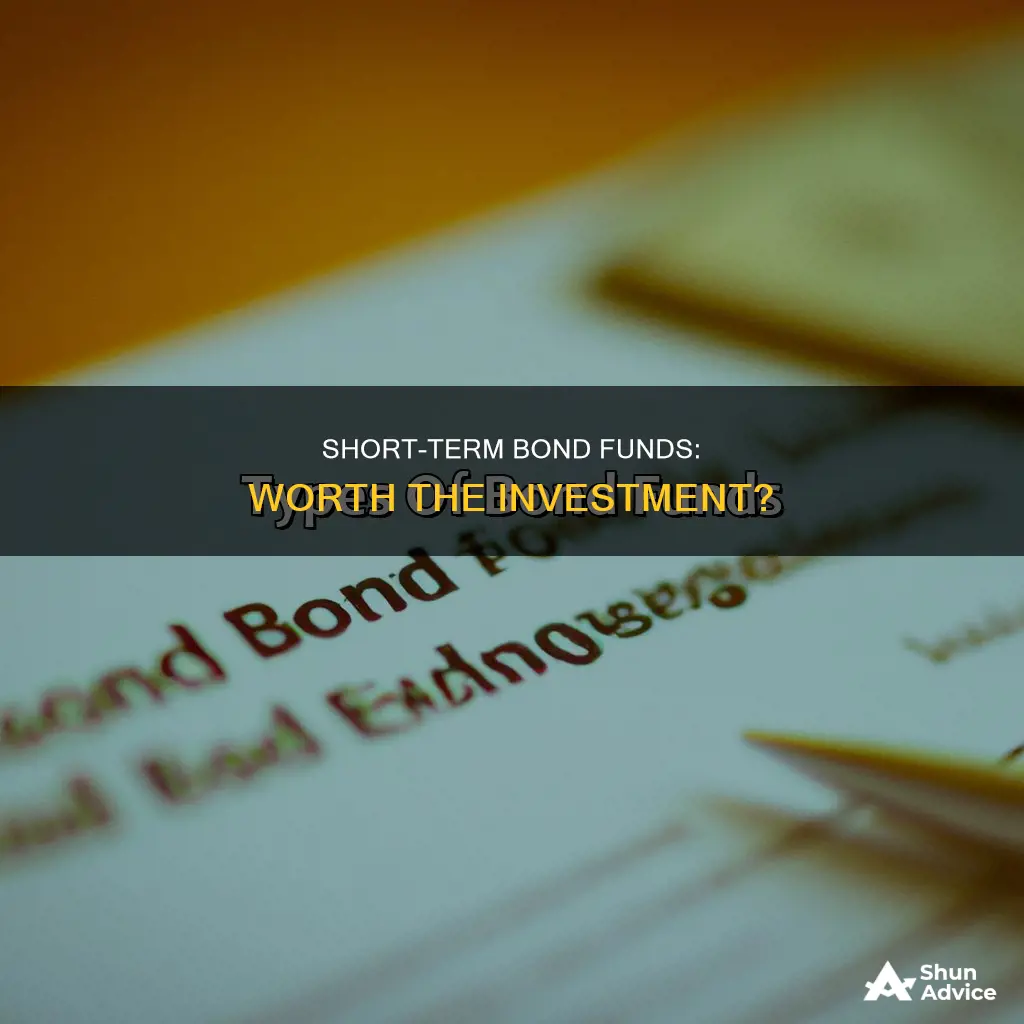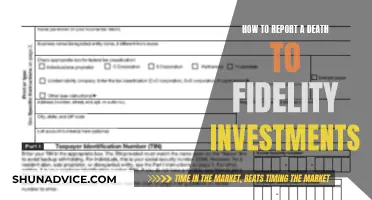
Short-term bond funds are a good investment option for those looking for a safe place to store their money in the short term. They are also a good option for those saving for a down payment on a house or a wedding, for example. Short-term bond funds are generally considered safe, liquid, and low-risk investments. They are also a good option for those who want a diversified portfolio without having to analyse individual bonds. Short-term bond funds also provide a higher potential yield than money market funds. However, it is important to note that short-term bond funds are not backed by the Federal Deposit Insurance Corporation (FDIC) and there is a risk of losing money. Overall, short-term bond funds appear to be a good investment option for those looking for a safe and liquid investment with a higher yield than money market funds.
| Characteristics | Values |
|---|---|
| Risk | Less risky than long-term bonds |
| Interest | Interest is paid at regular intervals |
| Timeframe | Usually a few months to a few years |
| Returns | Relatively stable and predictable |
| Access | Allows you to access your money sooner |
| Correlation with stocks | Low |
What You'll Learn

Short-term bond funds vs. money market funds
Money market funds and short-term bond funds are both excellent savings vehicles for the short term. They are liquid, easily accessible, and relatively safe. However, they can involve fees and may lose value over time. So, which is the better option?
Money market funds are a type of mutual fund that invests in short-term, low-risk securities such as treasury bills and commercial paper. They are considered extremely low-risk investments with a typical par value of $1. Money market funds are accessible through money market mutual funds or a money market bank account, where investors pool their money to buy money market securities. Shares can be bought or sold as desired, often with check-writing privileges. The net asset value (NAV) typically stays at $1 per share, so only the yield fluctuates. However, money market funds are not guaranteed by any agency, and fees can eat into profits.
Short-term bond funds, on the other hand, offer higher potential yields than money market funds but also carry more risk. A bond fund pools money from many investors to buy individual bonds, and each fund is professionally managed. A typical short-term bond fund invests in bonds that mature in two to five years. When you own a bond from a credit-worthy issuer, you will get the principal and interest rate you contracted for if you hold the bond until it is due. However, bond funds are subject to interest rate risk, credit risk, and prepayment risk.
When deciding between money market funds and short-term bond funds, consider your investment goals, risk tolerance, and current market conditions. Money market funds are excellent for emergency funds due to their stability and liquidity. Short-term bond funds offer higher potential yields and are a good option if you are looking for liquidity and a greater yield than money market funds.
Selecting Mutual Funds: A Guide for Indian Investors
You may want to see also

Pros and cons of investing in short-term bond funds
Pros of investing in short-term bond funds
Short-term bond funds are an attractive investment option for those seeking a stable and predictable source of income with relatively low risk. Here are some advantages of investing in short-term bond funds:
- Diversification and reduced risk: Short-term bond funds offer diversification by spreading your investments across different bonds, thus reducing the overall risk. Bonds are generally considered less risky than stocks and can help protect your portfolio during economic downturns.
- Income generation: Bonds provide a steady stream of income through regular interest payments. While bond yields may be lower than other investments, they can still offer attractive returns, especially in a low-interest-rate environment.
- Tax advantages: Depending on the type of bond and the issuer, some bonds offer tax advantages, such as federal and state tax exemptions. This can enhance your overall investment returns.
- Capital preservation: Short-term bond funds are less susceptible to changes in interest rates compared to long-term bonds. They also have a shorter time frame to maturity, usually a few months to a few years, which means you can access your money sooner.
- Predictable returns: Short-term bond funds can provide relatively stable and predictable returns. The fixed interest rates and shorter maturity periods make it easier to forecast the income generated by these investments.
Cons of investing in short-term bond funds
Despite the advantages, there are also some potential drawbacks to consider before investing in short-term bond funds:
- Lower returns: Short-term bond funds typically offer lower returns compared to long-term investments. The trade-off for the reduced risk and increased liquidity is often lower potential gains.
- Interest rate risk: While short-term bond funds are less affected by interest rate changes, there is still a risk of losing money if interest rates rise. If you need to sell your bonds before maturity, you may receive a lower price, resulting in an opportunity cost.
- Credit risk: There is always a chance that the bond issuer may fail to make timely interest or principal payments. Credit rating agencies assess the creditworthiness of bond issuers, but there is still a risk of default or downgrade in credit ratings.
- Limited upside: Short-term bond funds may not be suitable for investors seeking high growth potential. The stable and predictable nature of these investments may limit your upside compared to riskier investments.
- Liquidity risk: While short-term bond funds are considered liquid investments, there may be restrictions on withdrawals, and selling your bonds before maturity can incur transaction costs or impact the price you receive.
Funding Sources for Your Real Estate Investment
You may want to see also

Interest rate risk
When interest rates rise, new bonds with higher interest rates become more appealing to investors. Consequently, the value of existing bonds with lower interest rates decreases. If investors sell their bonds before maturity, they may receive less money than they initially invested. However, if investors hold on to their bonds until they mature, they will receive the full face value.
Short-term bonds are less affected by changes in interest rates compared to long-term bonds. This is because short-term bonds have a shorter time frame until maturity, usually a few months to a few years. As a result, the benefits of short-term bonds are that they allow you to access your money sooner and can provide relatively stable and predictable returns.
However, it is important to note that short-term bonds may not be suitable for all investors, depending on their investment goals and risk tolerance. Additionally, short-term bonds typically offer lower yields compared to long-term investments.
In the current market environment, interest rates have been rising due to the Federal Reserve's efforts to combat inflation. As a result, the value of existing bonds has decreased, and investors who need to sell their bonds before maturity may face losses. However, for investors who can hold their bonds until maturity, they will receive the full face value, mitigating the impact of interest rate risk.
International Equity Funds: Smart Investment or Risky Business?
You may want to see also

Credit risk
The risk of credit default depends on the credit quality of the issuer. Credit quality is determined by rating agencies like Moody's Investors Service and Standard & Poor's, which issue credit ratings based on the issuer's financial position, management, and other factors. Issuers with higher credit ratings are less likely to default on their bonds.
In addition to credit risk, other risks associated with bond investing include interest rate risk, liquidity risk, inflation risk, and currency risk.
Closed-End Funds: Smart Investment, Smart Returns
You may want to see also

Inflation risk
In addition, if interest rates rise in response to inflation, bond prices tend to fall. This can affect the market value of a bond if you decide to sell it before it reaches maturity.
To protect against inflation risk, investors can consider Treasury Inflation-Protected Securities (TIPS). TIPS are a type of Treasury security whose principal value is indexed to inflation. When inflation rises, the TIPS' principal value is adjusted up. If there's deflation, then the principal value is adjusted lower. Like US Treasuries, TIPS are backed by the full faith and credit of the US government. Interest is paid based on the adjusted principal every six months, and at maturity, investors receive either the original or adjusted principal—whichever is greater.
Overall, while bonds can be a relatively safe and low-risk investment, they do carry inflation risk. This risk can be mitigated by investing in TIPS or other inflation-protected securities.
Sector Funds: To Invest or Not?
You may want to see also
Frequently asked questions
Short-term bond funds are a type of bond fund that focuses on investing in bonds with shorter maturity dates, usually a few months to a few years. They are often considered less risky than long-term bond funds because they are less affected by changes in interest rates. Short-term bond funds can provide relatively stable and predictable returns and allow investors to access their money sooner. However, they may not be suitable for all investors depending on their investment goals and risk tolerance.
Short-term bond funds offer several potential benefits. They can provide diversification to an investment portfolio, capital preservation, income through interest payments, and potential tax advantages. Short-term bond funds are also less risky than stocks and can be a good option for investors seeking fixed income. Additionally, short-term bond funds have lower interest rate risk since they are less affected by changes in interest rates compared to long-term bonds.
When compared to other short-term investment options, such as high-yield savings accounts, money market accounts, and certificates of deposit (CDs), short-term bond funds generally offer higher potential returns. However, they also come with higher risks. Short-term bond funds are typically more liquid than other investment options, allowing investors to access their money more easily. Additionally, short-term bond funds can provide diversification and are suitable for investors who want exposure to a variety of bonds without analyzing individual bonds.
Investing in short-term bond funds carries several risks, including interest rate risk, credit risk, downgrade risk, and liquidity risk. Interest rate risk refers to the possibility of a bond's value decreasing when interest rates rise. Credit risk is the risk that the bond issuer may fail to make timely interest or principal payments. Downgrade risk is the possibility of a bond's credit rating being lowered, which can result in a lower price in the secondary market. Liquidity risk refers to the ease of selling a bond without incurring high transaction costs or a reduction in price. It is generally recommended to hold bonds until maturity to avoid these risks.







